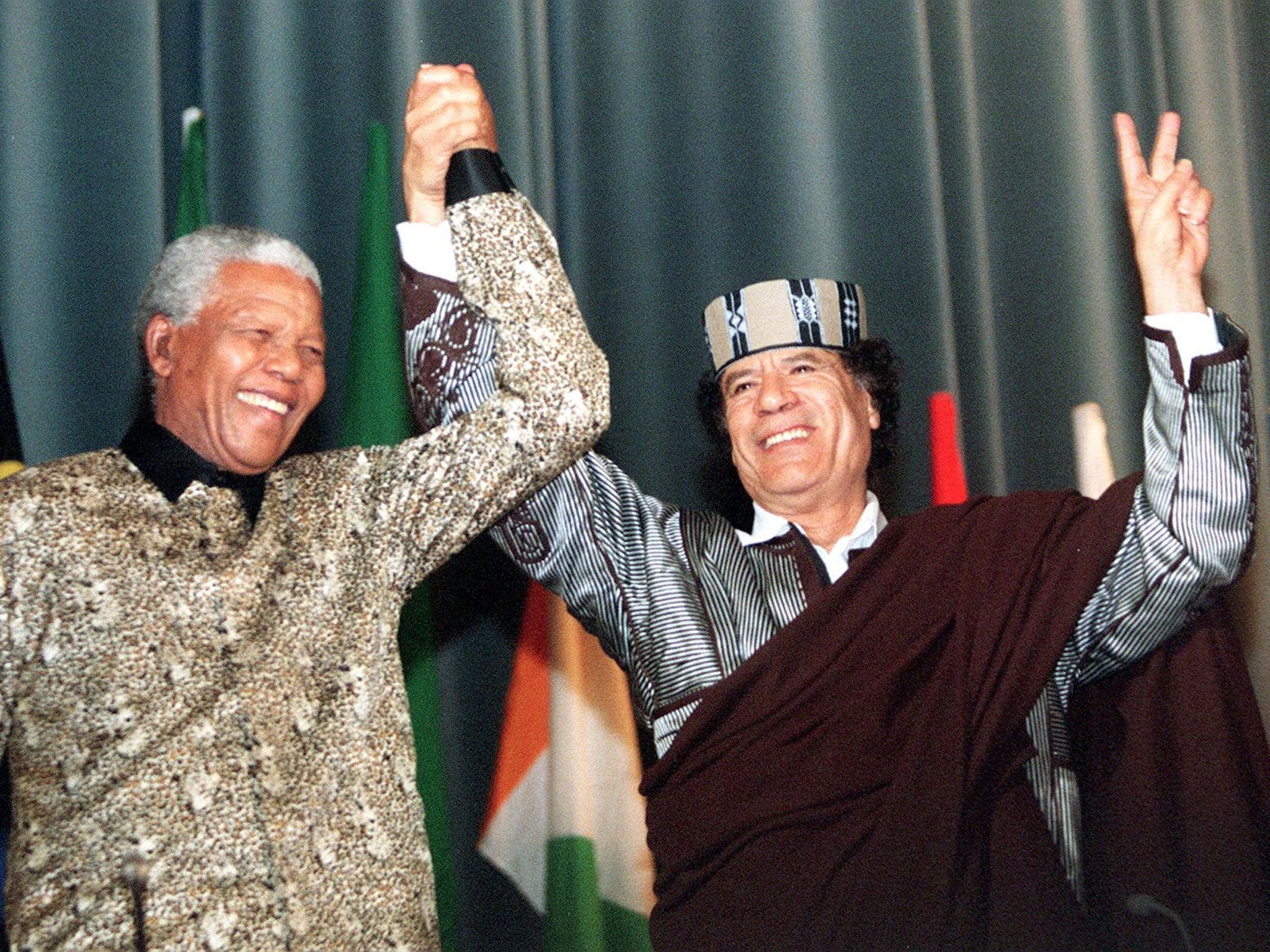Nelson Mandela’s foreign policy triumph was to stand against the West
Diplomatic Channels: President Mandela was not going to turn his back on Libya


The lying in state of Nelson Mandela was a scene of serenity and peace. Apple blossoms floated in the warm sunshine; people who had waited with great patience for hours filed past the coffin in silence; police carried boxes of tissues for those who stopped to cry afterwards. It was, for many, a matter of deep personal loss amid the extraordinary international focus: the last chance to say goodbye to Madiba, as they called him, before he was laid to rest where he had grown up, in the Transkei.
It was very different from the last leader I had seen “lying in state”: Muammar Gaddafi on the floor of a refrigerated meat store in Misrata after he had been captured, tortured and shot. There was glee among those who flocked to view. Families photographed children beside the corpse. At the end, the decomposing remains of the Brother Leader, as he had wanted his people to call him, were taken away in the night, to a secret grave in the desert for a thief’s burial.
There were ties between the two men which went well beyond being among the highest-profile heads of state in what used to be called the Third World. The founder of modern South Africa had been under intense Western pressure to shun the troublesome Libyan ruler who Ronald Reagan called a “mad dog”. But Mr Mandela would not acquiesce: “Those who feel irritated by our friendship with President Gaddafi can go jump in the pool,” was his response.
Libya provided steadfast support to the African National Congress as well as the rival Pan-African Congress, including considerable sums in financial terms, at a time when the US and countries in Europe with centre-right governments offered little more than lip service. Margaret Thatcher, one may recall, strongly opposed economic sanctions against the apartheid regime, as well as the sporting and cultural boycott which followed, even when the rest of the civilised world was pressing for them.
So there was understandable gratitude for Libya’s support among those in South Africa fighting the racists. President Mandela – one of whose grandsons is named Gaddafi – was not going to turn his back on Libya, even when his friend Bill Clinton urged him to do so. He made two official visits to Tripoli. Colonel Gaddafi, in turn, was invited to his swearing-in ceremony and received one of South Africa’s highest honours, the Order of Good Hope.
Mr Mandela then went on to play a key role in bringing Libya back from being a pariah state, first by helping to forge an agreement over the Lockerbie bombing, and then in getting the regime to dismantle its chemical and biological weapons programmes, as South Africa had done after the fall of apartheid.
Mr Mandela viewed what he had done with Libya as one of his greatest foreign policy achievements. Towards the end of his presidency, he declared: “It was pure expediency [on the part of the West] to call on democratic South Africa to turn its back on Libya and Gaddafi, who had assisted us in obtaining democracy. No one can deny that the friendship and trust between South Africa and Libya played a significant part in arriving at this solution.”
That was in 1999. After that, of course, Colonel Gaddafi learned to his cost, as did Hosni Mubarak in Egypt and Zine El Abidine Ben Ali in Tunisia, that the tilt to the West and co-operation against Islamist terrorism came to nothing during the Arab Spring, with Washington, London and Paris leading the way in abandoning them.
South Africa was among the many countries which were critical of the way UN Security Council resolution 1973, adopted in 2011 to establish a no-fly zone over Libya, was used by Nato to carry out an eight-month bombing campaign.
There were connections to the end: a somewhat strange plot, involving former soldiers who had taken part in the attempted “Wonga Coup” in Equatorial Guinea, to extract the beleaguered Libyan leader and his son, Saif al-Islam, as the rebels closed in on Sirte, their last place of refuge.
But what of the settlement over Lockerbie, the 25th anniversary of which has just passed? Libya paid compensation to the families of the passengers killed, and also handed over Abdelbaset al-Megrahi and Lamin Khalifah Fhimah, the alleged perpetrators, for prosecution. Many of us who covered the subsequent trial at Camp Zeist in the Netherlands, in front of Scottish judges, and who had followed the twists and turns of the case, are convinced that what happened was a shameful travesty of justice.
This is not the place to examine all the evidence why al-Megrahi should never have been found guilty. Years later, I was among journalists who went to the house in Tripoli where he lay dying. Some politicians and commentators in Britain and America were demanding to know at the time why he was not dead yet, since he had been sent back to Libya suffering from cancer. They got their wish soon afterwards, his supply of needed medicine having stopped in the upheaval following the fall of the regime.
As for the former South African President, he had spoken out against the conviction; pointing out the paucity of the prosecution case; visiting the prisoners in Barlinnie prison in Glasgow; supporting his appeal. But none of that save Abdelbaset al-Megrahi, an innocent man who became collateral damage in Mr Mandela’s great foreign policy triumph of bringing Gaddafi in from the cold.
Join our commenting forum
Join thought-provoking conversations, follow other Independent readers and see their replies
Comments
Bookmark popover
Removed from bookmarks